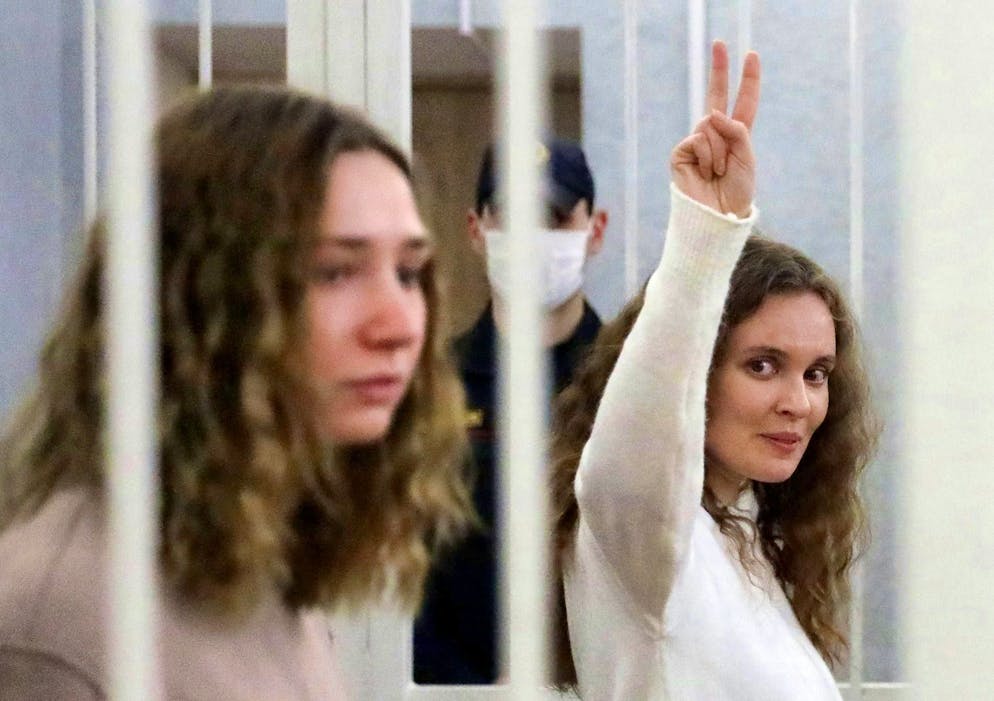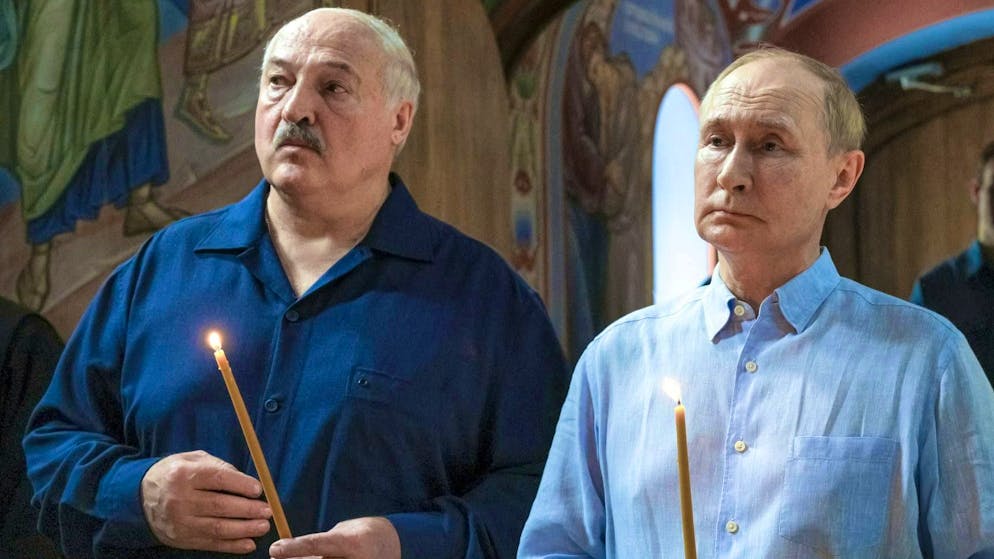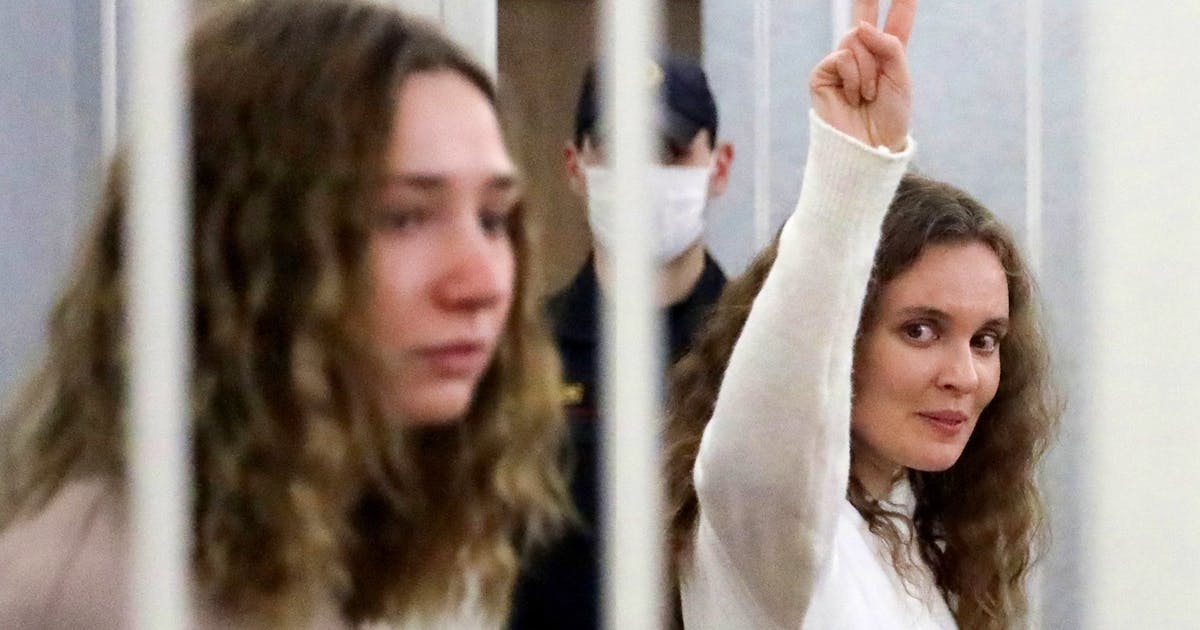
Journalist Katerina Bakhvalova makes the victory sign as she stands trial with her colleague Daria Chultsova in Minsk in February 2021: Women in prisons in Belarus can fare extremely badly.
KEYSTONE
Almost 200 of the 1,200 or so political prisoners in Belarus are women. According to human rights activists, they are often deliberately abused and humiliated.
Cold and isolation, too little to eat, inadequate medical care: Almost all political prisoners in Belarus complain about grueling and inhumane prison conditions. According to human rights activists, the women among them are particularly vulnerable.
“Women in prison live through hell and can’t even complain to anyone,” says Antanina Kanawalawa, who was held as a political prisoner in a Belarusian penal colony for four years. “The head of the prison told me to my face that people like me should be put up against the wall and shot.”
There are almost 1,200 political prisoners in Belarus. 178 of them are women. They are often deliberately abused and humiliated, explains Pavel Sapelka, a lawyer with the human rights organization Vyazna. They are threatened with the loss of their children and their medical problems are ignored.
Fear for custody of the children
Antanina Kanawalawa was released in December. In an interview with the AP news agency, the 37-year-old spoke of the fears and torment she suffered. When she was arrested, she almost lost custody of her two small children, she says.
In detention, her eyesight deteriorated when she had to sew military uniforms in a poorly lit room. Even basic things like hygiene products were denied to her.
Independent experts appointed by the United Nations Human Rights Council speak of “appalling” conditions for women prisoners in Belarus. They complain of a “blatant lack of accountability” for the behavior of prison staff.
Lukashenko: “Prison is not a vacation spot”
The authoritarian government has denied international observers and independent monitoring teams access to the prisons. President Alexander Lukashenko calls the prison conditions “normal” and has emphasized that “prison is not a vacation resort”.

No choirboys: Alexander Lukashenko (left) and Vladimir Putin visit a place of worship in Valaam, Russia, on August 1.
KEYSTONE
Lukashenko has been in power for more than three decades. He remains in office thanks to elections that the West describes as neither free nor fair. Dissidents are intimidated, silenced and arrested.
When hundreds of thousands of people took to the streets after the controversial 2020 election, Lukashenko cracked down. More than 65,000 people were arrested and hundreds of independent media and non-governmental organizations were closed and banned.
“Rubbing salt into this maternal wound every day”
Opposition politicians have been imprisoned or fled abroad. And even though Lukashenko released around 300 political prisoners last year, others are still being arrested.
Antanina Kanavalava was a confidante of opposition leader Svetlana Tikhanovskaya, who now lives in exile and challenged Lukashenko in the 2020 elections. Kanavalava was sentenced to five and a half years in prison for “participation in mass riots”. She left her six-year-old son Ivan and four-year-old daughter Nasta behind.
“For a mother, not seeing her children for four years is real torture,” says Kanawalawa. “The authorities know this and rub salt into this maternal wound every day. They demand that I sign confessions and cooperate with them.” Kanawalawa has since been reunited with her children: her grandmother had brought them to safety in Warsaw while her mother was in custody.
Solitary confinement and solitary confinement without contact with children
According to the UN experts, female prisoners in Belarus are subjected to “arbitrary punishments, including solitary confinement and incommunicado detention without contact with their children”. Palina Sharenda-Panassiuk spent more than four years in detention in several prisons and penal colonies, 270 days of which were spent in solitary confinement.
“The authorities deliberately exploit the vulnerability of women to humiliate them and create unbearable conditions,” says the 50-year-old after her release from prison. She describes unhygienic conditions and constant cold, which make illnesses chronic.
Human rights activists are particularly concerned about prisoners such as Viktoria Kulscha, who was originally sentenced to two and a half years in prison because of a Telegram channel. Drivers were asked via Telegram to block roads during the 2020 protests.
Hunger strike as a protest
Because she allegedly disobeyed instructions from prison officers, Kulscha was sentenced to a further four years in prison. According to human rights groups, the 43-year-old went on hunger strike at least six times to protest against mistreatment in penal colony no. 24 in Sarechcha.
“Viktoria cut her wrists and went on hunger strikes to protest against the tyranny of the prison authorities and this slaughterhouse,” says Sharenda-Panassiuk, who was detained in the same penal colony. “But it got worse and worse and they are driving them to the edge of the abyss.”
Natallia Dulina, convicted of extremism in 2022, was released in June along with 13 other political prisoners. The 60-year-old Italian lecturer describes particularly degrading conditions in penal colony no. 4, including a “disgraceful cage” in the yard.
Women in the cage
Women were forced into this cage for hours on end, whatever the weather, to pay for alleged breaches of discipline. There are no such cages in penal colonies for men, says Dulina.
Even after their release, the torment and fear continue to haunt the women. “Prison is not over yet,” says Antanina Kanawalawa, who now lives with her children in Warsaw. She adds: “The fear of losing my own children haunts my dreams.” And her husband is still in custody.
“It’s impossible to get used to the tyranny of the Belarusian authorities,” Kanawalawa emphasizes. “But it’s even harder to explain to children and yourself the high price Belarusians pay for their desire for freedom.”
